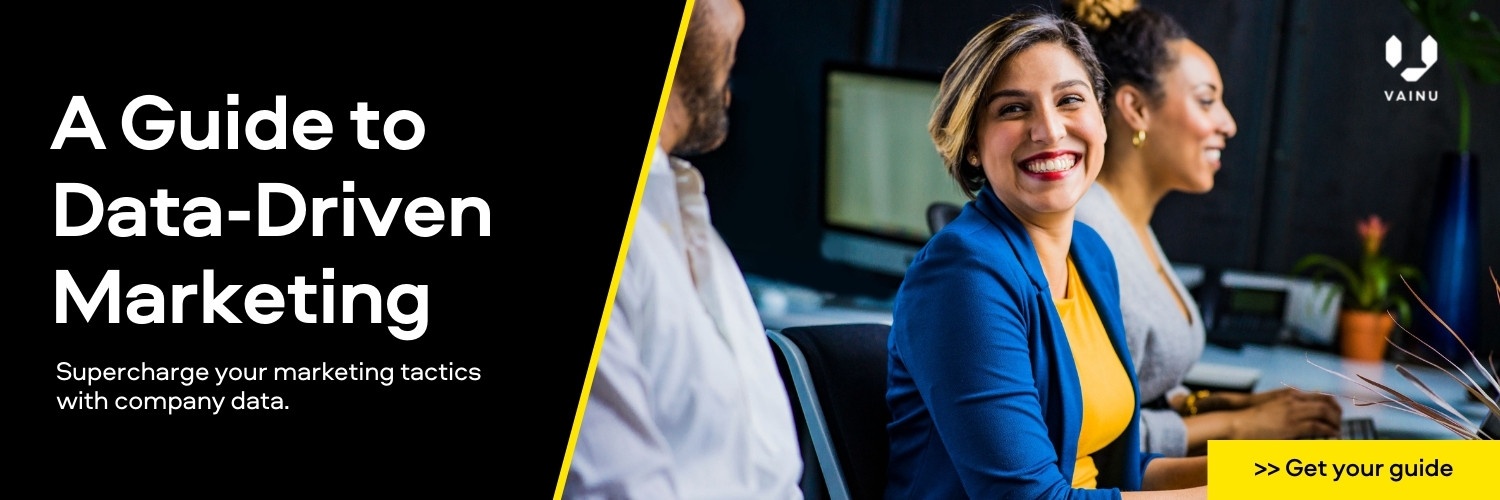The Vainu Method For Lead Qualification
No matter how good your product or service is, it won’t always be the right fit for every potential customer. That's why lead qualification is such an important step in the sales process. By qualifying your leads, you are able to figure out which companies your organization would create the most value for. This allows you to focus your sales efforts on the companies that are the most likely to benefit from your solution. Simple enough, right?
Here's the thing: Lead qualification takes time, and time is a scarce resource. To avoid unnecessarily wasting time on vetting potential customers, you could automate the lead qualification process. That’s what we do here at Vainu, and we have affectionately dubbed it the Vainu Method™ for lead qualification.
To maximize your sales potential, the leads that are the most likely to buy have to be a priority. The Vainu Method will take you through the lead qualification process, inform you how to automate its most time-consuming steps, and explain why you shouldn’t be afraid to disqualify a lead that’s not worth your time.
Qualifying is all about gathering the insights necessary to make a solid judgment on whether or not to invest time into an account.
What is lead qualification?
Simply put, lead qualification is the process of determining whether a prospect is likely to become a customer, which helps salespeople decide where they should focus their efforts. By qualifying leads, you’ll be able to avoid unforeseen circumstances, such as a lead actually not really benefiting from your solution, or a lack of budget.
There are numerous types of lead qualification, such as lead scoring, where, using a predefined scale, salespeople attempt to determine the likelihood of a lead becoming a customer. When using factors related more closely to the account rather than the person, the process is called account scoring (more on that behind the previous link).
Remember, it’s in your best interest to do your due diligence on potential customers, and lead qualification is the way to do it. In the end, you’ll be happy that you did!
Lead qualification drives a successful sales process
Lead qualification is critical because nobody likes wasting valuable time.
Consider this scenario. You have a lead generation process that’s performing well thanks to it striking the right balance of sales automation, inbound marketing, and good, old-fashioned sales work. This wouldn’t be unusual since most sales and marketing teams prioritize finding new leads. In this scenario, you're likely churning out more leads than your army of salespeople can handle. Luxury problem, right?
But how do you decide which of these leads are worth your time? How do you avoid spending time working on leads that aren’t going to buy while good opportunities slip through the cracks?
The answer is right in front of you: Lead qualification. A quick look into what it is that actually makes a qualified lead should be enough to convince anyone of the importance of a bulletproof lead qualification process.
Qualified leads
- Are aware of the solution their organization needs
- Are aware of your company’s offering
- Are able to afford your product or service
- Are unlikely to churn
Unqualified leads
- Are unaware of the solution their organization needs
- Are unaware of your company’s offering
- Are unable to afford your product or service
- Are likely to churn
With a functioning lead qualification process, you'll see the following benefits:
- Ability to focus on the companies that are most likely to buy. It may seem like common sense, but don’t waste time trying to sell to a company without an appropriate budget. It’s probably also a good idea to avoid spending time on companies that won’t get much value out of using your product or service. In either case, the probability of actually closing a deal is low.
- Make your sales pitches more successful. Understanding what makes a qualified lead allows you to tailor your sales pitch and increase your chance of winning business. With the right qualifying questions, you can gain insight into the pain points of the potential customer and present a solution in your pitch. By doing this, you won’t only be presenting a value proposition, but will also implicitly be communicating that you understand the core of what they do.
- Make qualified estimates of deal size and expected closing time. Lead qualification allows you to mitigate the risk of unexpected and unwanted surprises in the later stages of the sales process when you have already a significant amount of time on the deal and should be focussing on closing the deal.
- Disqualify bad-fit leads. Many salespeople are reluctant to disqualify prospects and shrink their pipelines—let’s change this mindset. It’s a much more effective use of your time to concentrate your efforts on a smaller number of high-quality leads instead of spreading yourself too thin by trying to manage a large number of leads that may not be an ideal match for your organization’s offering.
Next, we'll go through the three steps that make the Vainu Method for lead qualification to sell strategically and focus on quality leads.
How to do lead qualification the right way
1. Understand your business and target group
A successful lead qualification process (aka the Vainu Method™) starts with the salesperson, not the lead. A salesperson has got to know their business, the benefits of its offering, and the customers who would get the most value from your offering (your ideal customer). Having this information at the forefront of your mind will let you make better judgments when deciding which companies to pursue.
There’s more to lead qualification than a quick check of whether a company falls within your defined target group. While a company may seem like a good fit at first glance, there are several behind-the-scenes factors that can affect the chances of you closing a deal.
2. Establish a data enrichment process for better lead qualification
Traditionally, salespeople would qualify leads manually during the early stages of the sales process, such as by using frameworks like BANT (Budget, Authority, Need, Timeline). The qualifying process would go something like this: A salesperson picks up the phone and tries to connect with a lead for a discovery call. If they were able to connect, they would ask them a set of predetermined questions, after which the rep would be able to determine whether a lead is worth pursuing or not.
As you can likely imagine, calling each lead requires a lot of time and time on the part of the salesperson. Fortunately, salespeople today don’t have to do this anymore, as they have access to sales intelligence and sales tools, which can help them allocate their time more effectively by automating the lead qualification process. But, how does this automation process decide whether a lead is qualified or not? By using company information.
Nowadays, there is an immense amount of information available online, and this amount of data is only going to continue growing. With this information at your disposal, it would, for example, be easy to find out whether a potential customer is using a competitor’s service, or if the potential customer generally tends to be open towards adopting new technologies. By looking into insights drawn from the web technologies a company uses, you would no longer have to pick up the phone to get this kind of information about a potential customer.
Data enrichment can vastly improve any lead qualification method. In essence, data enrichment adds missing data and amends potentially incorrect data so that you have an up-to-date and informative contact database. Having access to an exhaustive range of data points will help you develop a deeper understanding of the companies your leads work for, and let you qualify leads automatically by going through a series of data points.
Take this example: A lead is entered into your contact database with nothing but a first name, last name, and an email address. That's not a whole lot of information to use when qualifying a lead! With a data enrichment process in place, a sales intelligence tool would be able to link that lead to a company by, for example, matching an email address domain to a company. This would then give you access to company data points, such as revenue, employee count, industry, website technologies, you name it. Once that’s done, you'll have access to a comprehensive profile on that lead, and you’d be able to accurately qualify them. On top of that, instead of having to go through a list of basic questions on your first call with the lead, you'll be able to get off on the right foot and have a fruitful and mutually beneficial first interaction.
It’s not about knowing the most, it’s about knowing the right information.
3. Conduct relevant discovery calls
Just to be clear: Discovery calls still matter. After all, the more information, the better! Lead qualification questions give you the opportunity to develop your understanding of a lead and their circumstance. But let’s straighten one thing out—a discovery call shouldn’t be an interrogation.
If you've done your homework, you're pretty far in the lead qualification process. You've gained sufficient insight to make an educated guess on whether it is worth your time contacting the lead. At this stage, the questions you would be asking to further qualify a lead would differ from organization to organization. You don't need to go through a standardized script like a robot. Instead, it’d be more productive for you to spend your time building a rapport with the lead and weave any remaining qualifying questions into the natural flow of your conversation.

Bottom line
All sales organizations are hungry for leads. However, a constant stream of leads without a proper lead qualification process in place is worth little.
By tapping into company information and actionable insights, your lead qualification process will run on autopilot. Vainu uses a web-indexing technology to collect information on over 100 million companies globally, pairing and matching that information to the company profiles that exist in our robust company database. Using Vainu’s insights and open data enables you to stock your pipeline with pre-qualified leads, letting you know which companies to reach out to and which to drop.
Curious to see how the Vainu Method works? Then feel free to reach out to us at any time and start your free trial!

